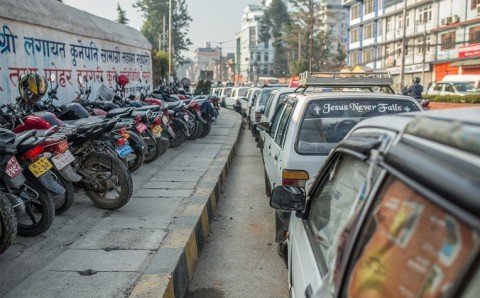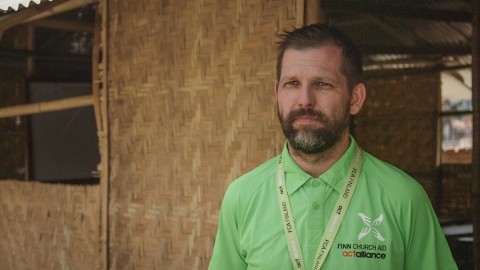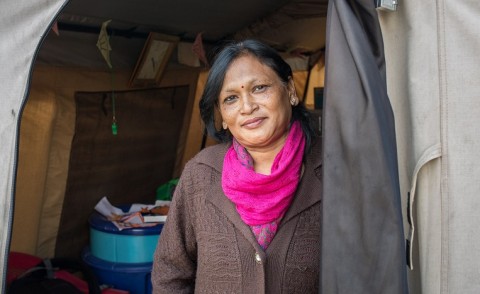Fuel crisis in Nepal slows down recovery from earthquake
India has placed Nepal under unofficial trade blockade.
Traffic in Kathmandu, the Nepalese capital, is uncharacteristically slow. The air is not thick with exhaust fumes even on the main roads and the sky is clear blue. The police guards petrol stations. The stations have gated entrances, and cars and motorcycles stand in long lines on the streets.

Line to petrol station in Kathmandu. Distribution normally starts in the evening, but often there isn’t enough fuel for everyone waiting in line. In such cases, vehicles are left in the line waiting for the following day, or the day after.
When the gates are opened, the line of cars and motorcycles begins to move. Vehicles are pushed forward in order to save precious fuel.
There is a fuel crisis in Nepal caused by political motivations. India and some of Nepal’s ethnic minorities don’t accept Nepal’s new constitution, which was signed in September. India is by far the most important trade partner of Nepal and has placed its small neighbour under an unofficial trade blockade.
According to India, the border is closed because of insecurity caused by demonstrations. Nepal blames India for inciting riots and considers the act as a blockade.
Negotiations for lifting the blockade came to a halt when an Indian man was killed in riots in the Terai region on the border between Nepal and India. The UN secretary general Ban Ki-moon has appealed for the parties to open the border, but it doesn’t seem like a solution to the dispute is in sight.
The few buses still operating are crammed full, and people are even sitting on the roofs. Under normal conditions, travelling on the roof is fined, but not now.
A taxi driver has not had time to wait in line. He says he bought his gasolene on the black market – at five times the normal cost.
Assistance work has come to a partial halt
The timing of this blockade is particularly inconvenient for Nepal as it is still suffering from the effects of the historically severe April earthquake. Half a million homes are destroyed. In the 1countryside, entire villages are left in ruins.

“Pupils and teachers know that the bamboo shelters are safe. When we had aftershocks for a long time following the earthquake the pupils did not run out of the bamboo classrooms”, says Juha Valta, Finn Church Aid Education Specialist.
“People don’t want to talk about the earthquake, but many suffer from it. In children, the anxiety caused by the earthquake manifests in sleeplessness, nightmares, lack of motivation and underachievement in school”, says Juha Valta, Finn Church Aid Education Specialist.
Juha Valta has been working in Nepal since June. He gives Nepalese teachers training on how to manage the post-earthquake situation.
The training is given in cooperation with Nepalese education authorities and gives teachers and pupils tools to manage their anxiety and identify when peer support is not enough and professional help is needed.
“Teacher training is important right now, because teachers are an important resource in schools and communities. Through teachers we can advance important make important advancements. Training includes elements from hygiene to teaching methods. All this aims to make schools safer and more child-friendly learning environments”, Valta explains.

Tent as a teachers’ lounge. “I don’t know where I’m going to get the money to rebuild my school. This is the most challenging situation of my life”, says Mayia Malla, Director of the Bal Bikas School on the outskirts of Kathmandu.
Finn Church Aid has been able to continue teacher training as planned, but the construction of temporary learning spaces has halted. There are no materials for sale and fuel is in short supply. This has also prevented the last batch of corrugated iron sheets for building homes from being distributed from FCA’s storage.
Juha Valta says the situation in the country is extremely difficult. Hundreds of thousands of people living in temporary shelters are in need of assistance, but fuel shortage prevents aid organisations from delivering relief.
“Winter is coming to Nepal, and people are living in tin shacks they’ve built as shelters for themselves. Temperatures may drop below zero at night, up in the mountains frost can get severe”, Valta says.
Proper rebuilding hasn’t even begun yet. The damaged, dangerous buildings are still standing because demolition costs too and the poor country doesn’t have money.
Text: Ulla Kärki
Photos: Ville Asikainen